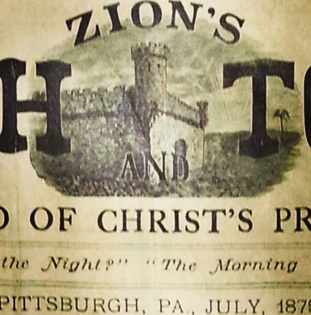We
are all influenced by our surroundings, and this article illustrates how
Charles Taze Russell might have been influenced by his at the Allegheny
cemetery.
The
video “Jehovah's Witnesses—Faith in Action, Part 1: Out of Darkness” portrays the funeral of Ann Eliza Birney Russell,
CTR’s mother. She died when Charles was about to turn nine years old. The
reconstructed shot in the film has obviously been closely modelled on the
Russell family plot that you can visit in the Allegheny cemetery today.
Screenshot from Jehovah's Witnesses - Faith in Action, part 1.
Copyright: Watch Tower Bible and Tract Society of Pennsylvania.
At
the time Ann Eliza died, five interments had already taken place. CTR’s Uncle and Aunt, James and Sarah, were
there, but they died before he was born. It was James who purchased the standard
plot for ten graves originally - although only nine spaces were used. Also,
three of Charles’ siblings had died and were buried there.
Young
Charles may have attended the funerals of his two brothers and one sister, and
then of course his mother. As an adult in his 20s he would likely have attended
the funeral of his Uncle, Charles Tays Russell, who was buried in the row
behind.
So,
Allegheny cemetery was definitely on CTR’s radar. Below are two modern
photographs of the main entrance through which you would have to travel to the
part of the cemetery where the Russell plot is found. Notice the round towers
on the ramparts.
Now just think what CTR did when he founded his own magazine, Zion’s Watch Tower and Herald of Christ’s Presence. From the first issue in 1879 until the end of 1890 it had the same graphic on the masthead. And even when the paper gained a proper cover in 1891, the graphic below was retained until December 1894 at the head of the opening article.
Now just think what CTR did when he founded his own magazine, Zion’s Watch Tower and Herald of Christ’s Presence. From the first issue in 1879 until the end of 1890 it had the same graphic on the masthead. And even when the paper gained a proper cover in 1891, the graphic below was retained until December 1894 at the head of the opening article.
The
tower and wall do look somewhat familiar!
I
am very grateful to the author of “Watch Tower
of Allegheny Historical Tour” who made this original suggestion, and who
also supplied the most recent photographs included in the article.
Other
familiar images for the Allegheny cemetery were Egyptian motifs and a homage to
Egyptian architecture. This was quite common in many cemeteries of the era,
both in American and the UK. Here are some modern photographs of examples in
the Allegheny cemetery.
Coming
closer to the area CTR visited, if you look at the family graves and then just
to the left, this is what you can see.
The
Egyptian theme is preserved with a steep pyramid monument and then, just behind
it, there is a monument of an open book. This pyramid is a bit the worse for
wear because it was damaged by a local tornado many years ago. However, the
Russell grave markers in front were unharmed as they were laid flat on the ground.
The book with names inscribed was a fairly common monument based on texts in
Daniel and Revelation.
But
put the two images together, and you might see the idea for the monument that
was erected on the United Cemeteries plot after CTR was buried there – a
pyramid with open books on each side and names inscribed. The idea was
reportedly suggested by J A Bohnet, but was agreed by CTR. And maybe these
familiar images from his childhood had a part to play in that.
Conjecture
of course – both the suggestions in this article are – but a possibility none
the less.










No comments:
Post a Comment